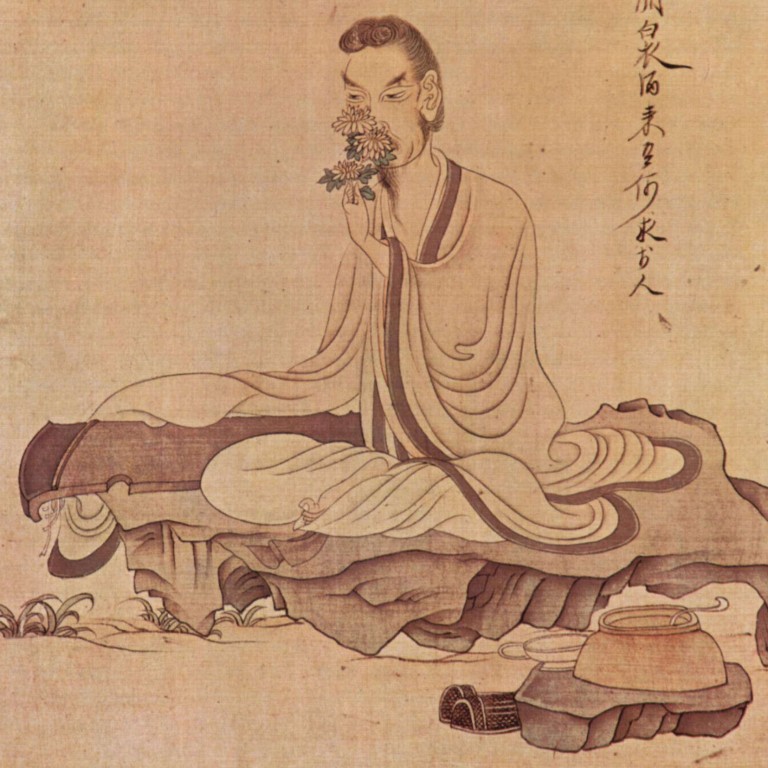
Why are young Chinese people criticised for ‘lying flat? It proved an invaluable cultural gain for the country once
- If the intellectual Tao Yuanming hadn’t decided he’d had enough of the political arena of the time, his great works of literature might never have been written
- While today’s young people in China seek to quit the rat race for different reasons, both are informed by a sense of disillusionment with the world
Many young people in mainland China are not only choosing, or forced by economic circumstances, to remain childless, a substantial number of them are removing themselves from the rat race in a recent phenomenon known as “lying flat” (tangping).
Discouraged by uneven access to resources and opportunities, the futility in chasing shifting and unreachable socio-economic markers, and the heavy toll the chase is taking on their minds, bodies and relationships, many young Chinese are simply opting out. This isn’t an exclusively Chinese development; youths in many parts of the world face the same predicament, and have reacted with similar resignation and cynicism.
At various times in China’s past, many intellectuals, whose primary reason for being was to use their erudition in the service of their ruler, the state and its people, chose to withdraw from government to live in semi-seclusion.
Some simply could not stomach the rough and tumble of political life. For others, it was a form of passive resistance against rulers or regimes that they disagreed with. During times when the whole or parts of China came under foreign rule, many intellectuals refused to serve the new rulers who were Mongol, Manchu, Xianbei, and so on, and occupied themselves with private pursuits.
From ‘Six Arts’ to repressive rote learning: China’s education history
The fall of the first Chinese empire of the Qin and Han dynasties (221BC-AD220) was followed by a period of disunity lasting 370 years, when China was divided into north and south, with non-Han Chinese regimes dominating the lands north of the Yangtze River. The constantly changing patchwork of petty kingdoms in the periphery added to the mayhem of that period. Against this chaotic backdrop, many learned men rejected government service, which had long been the accepted path of career advancement for intellectuals, and devoted themselves to writing, farming, mysticism, religions like Taoism and Buddhism, and even commerce.
Tao Yuanming (c.365-427) was one such intellectual. He was the great-grandson of a famous general and the grandson of a regional governor, but his family had already come down in the world by the time he was born. Studious as a child, he began serving in government at the age of 20. After more than 10 years languishing in a series of low-level positions, none of which he served for long, he walked away from his role as a district magistrate after several months, famously saying that he refused to “break his back for 5 dou of rice”, or around 10kg in today’s reckoning.
Tao Yuanming neither had the temperament nor guile to thrive in the political arena. He also despised the rulers and powerful men of his day, deeming them as unprincipled and corrupt. Leaving his government job behind and retiring to a farm in AD405 was the best thing he had ever done, and an invaluable gain for Chinese literature. For the next two decades, Tao Yuanming tilled his land and wrote works of prose and poetry that are still read in the present day, such as his famous pastoral poems that describe the pleasures and privations of living off the land.
Compared to members of the literati in China’s past who withdrew themselves from the world, young people in China today seek to get out of the rat race and “lie flat” for very different reasons. However, both are informed by the sense of disillusionment with the world in which they find themselves, and the despair at their place in that world. While some will criticise them for giving up far too easily, perhaps the “lying flat” trend will stimulate a rethink in mainland China about a wider and more inclusive definition of what success is.

